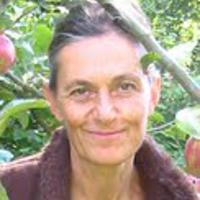 It began last week. Not just the dip in the temperature, the closing in of night, the leaves turning gold and tawny in the lanes and the proliferation of mushrooms, but the unexpected appearance of those underground veg on the table. Although there were still cosmos and California poppy flowering in the gardens, winter had put his bony leafless hand on the pot and suddenly we were all thinking Roots.
It began last week. Not just the dip in the temperature, the closing in of night, the leaves turning gold and tawny in the lanes and the proliferation of mushrooms, but the unexpected appearance of those underground veg on the table. Although there were still cosmos and California poppy flowering in the gardens, winter had put his bony leafless hand on the pot and suddenly we were all thinking Roots.
At our Dark Mountain meet-up in Norwich last week, Jeppe (just back from Denmark) served up roasted veg – parsnip, swede, carrot – and Brussel sprouts. We all tucked in heartily to spicy and warming dishes of cous cous, quinoa and Puy lentils before discussing the hands-on practical side of the movement, here exemplified by Simon Fairlie’s recent blog, Growing Up Dystechnic.
Our conversation was all about time. The time it takes to cook by hand, chop and watch the stove, to grind seeds and spices, using the ancient tool of the pestle and mortar (or in my kitchen a volcanic Mexican molcajete). How those things link you in with other times and places and peoples in a way machine-mixed or factory-made food can never do. How crafting the materials of life, including food, runs along another groove to gimme-now 24/7 consumerism. Time is what you need when you enter the slow cook, downshift winter. The days of quick tossed salads and leaves and the sweet and hot Indian summer dishes that were the focus of our Happy Monday’s Mexican Fiesta are ceding to stews and soups and warm, wholesome stuff that requires a different attention. In the Chinese Five element system we’re moving from the spleen "mother" foods (think pumpkin and sweet potato ) into the realm of the "father" (lung) where the tastes are pungent, strong and dark.
 We will need to have recourse to this robust simple fare because out there the weather has been dire. The worst autumn on record, declared the Farmers Weekly, as growers everywhere are struggling to get their potatoes out of the ground, roots are rotting, leaves suffering from mildew and barley struggling to come through water-logged land. Across the UK and the world food prices are rising. Animals are being mass-slaughtered as the price of feed, after a summer of drought in the US and elsewhere, has risen prohibitively.
We will need to have recourse to this robust simple fare because out there the weather has been dire. The worst autumn on record, declared the Farmers Weekly, as growers everywhere are struggling to get their potatoes out of the ground, roots are rotting, leaves suffering from mildew and barley struggling to come through water-logged land. Across the UK and the world food prices are rising. Animals are being mass-slaughtered as the price of feed, after a summer of drought in the US and elsewhere, has risen prohibitively.
Here a bag of organic potatoes that cost us £8 last year is now £24. Malcolm, who has been providing us with a box of veg for nine years has almost no apples, no parsnips, small onions and smaller potatoes, says it is unlikely we will get a box in the new year.
There is one bright green light ahead however: the brassicas may yet be all right, he tells us.
Cabbage is one of our low-carbon winter mainstays. Somewhere around now I can’t get enough of those greens: kale, Brussel sprout tops, wrinkly and straight cabbages, all for putting in the stew pot or for steaming and dressed with olive oil and lemon, or tamari and sesame seeds. Or best of all making endless creative varieties of coleslaw. Here is an economical, quick to prep, slow to cook recipe that warms up every meal. Enjoy!
I bay leaf






